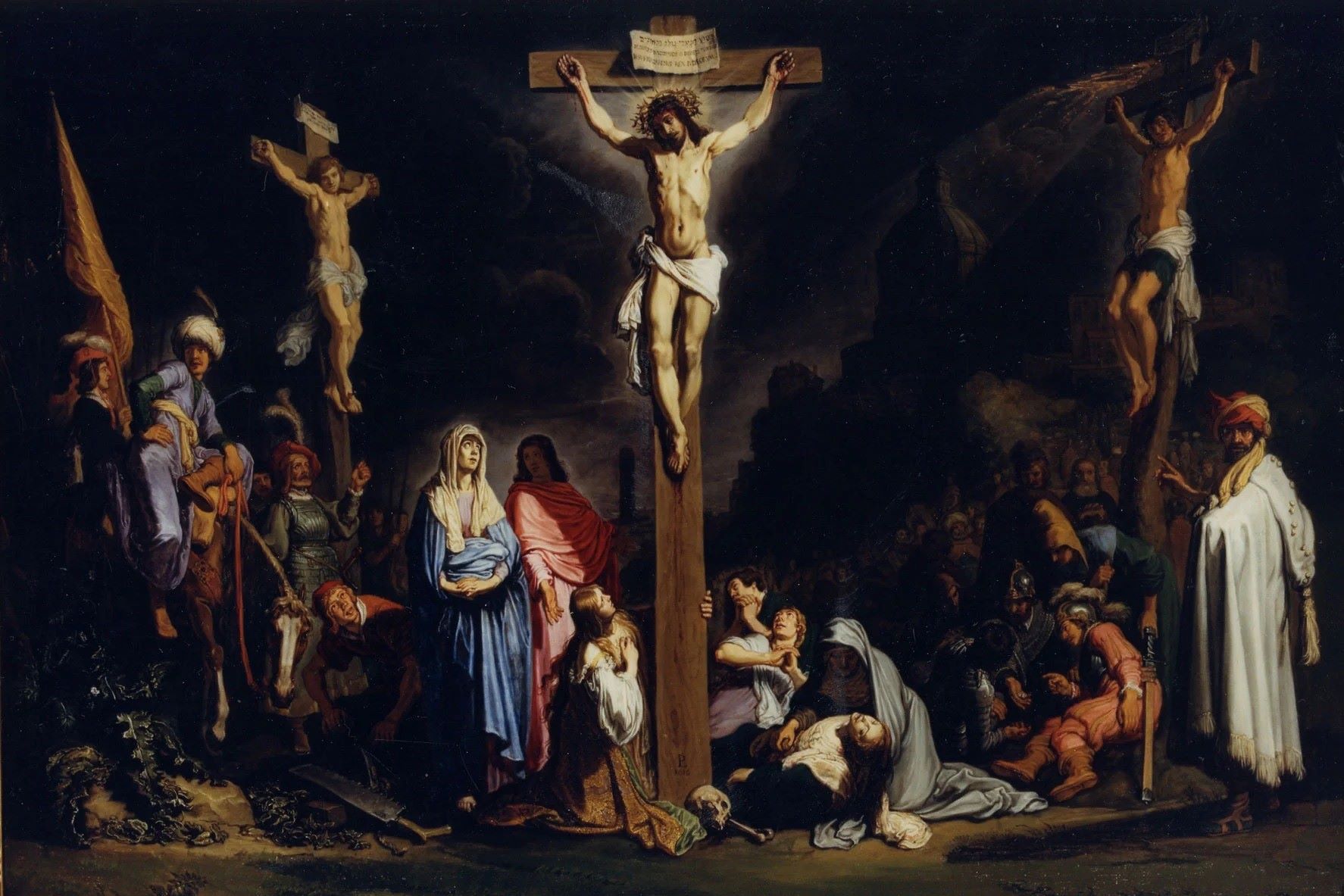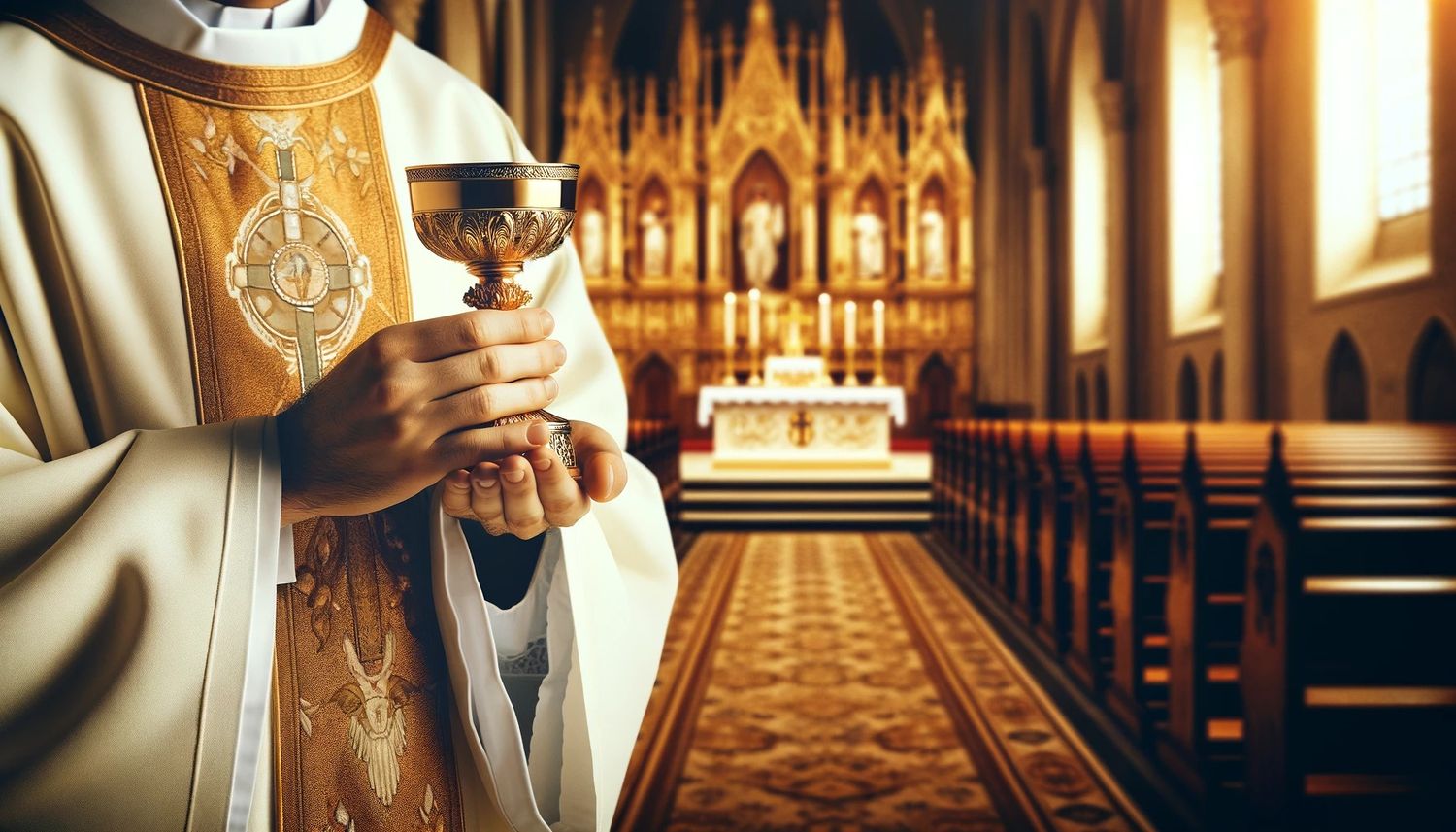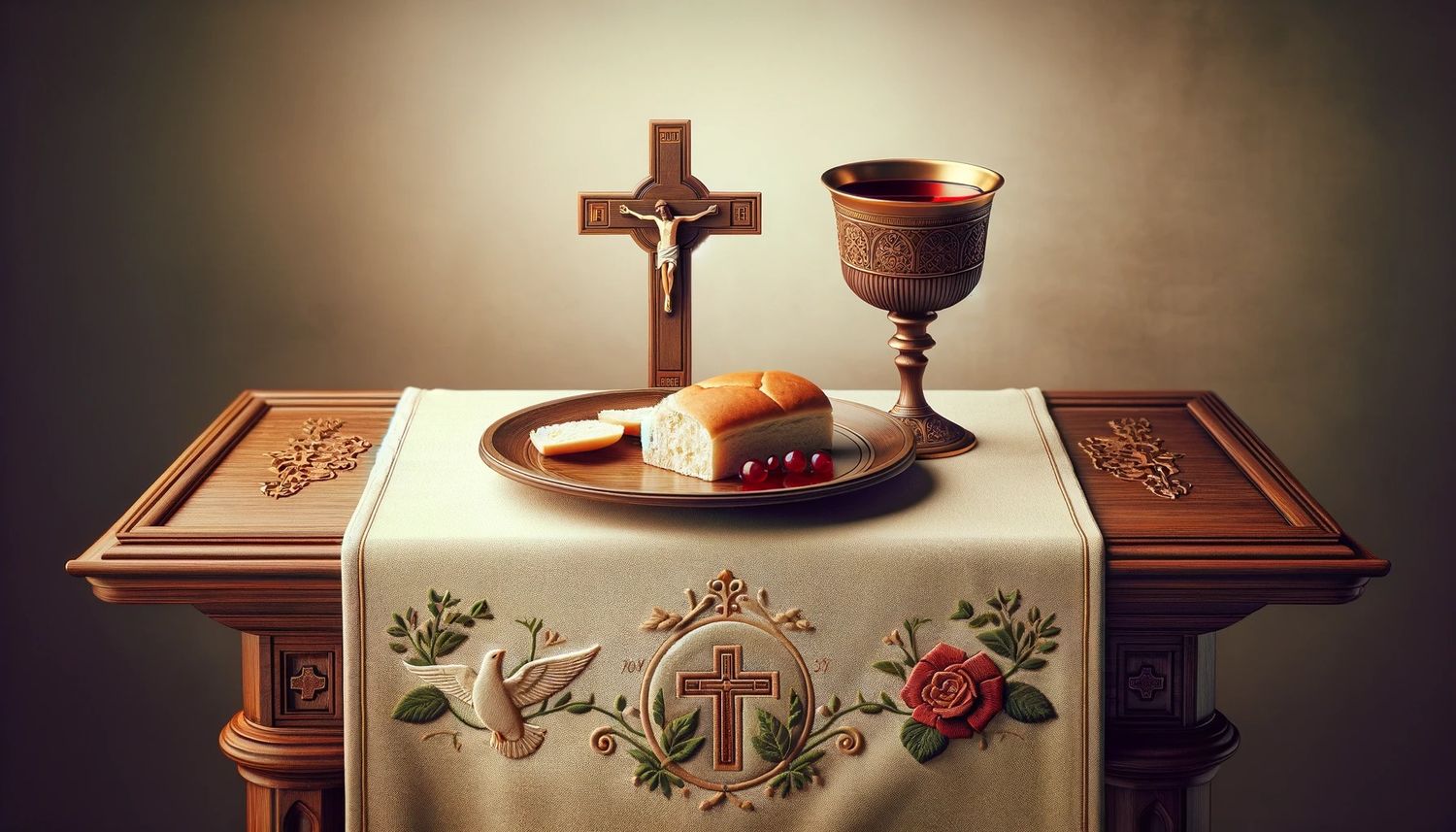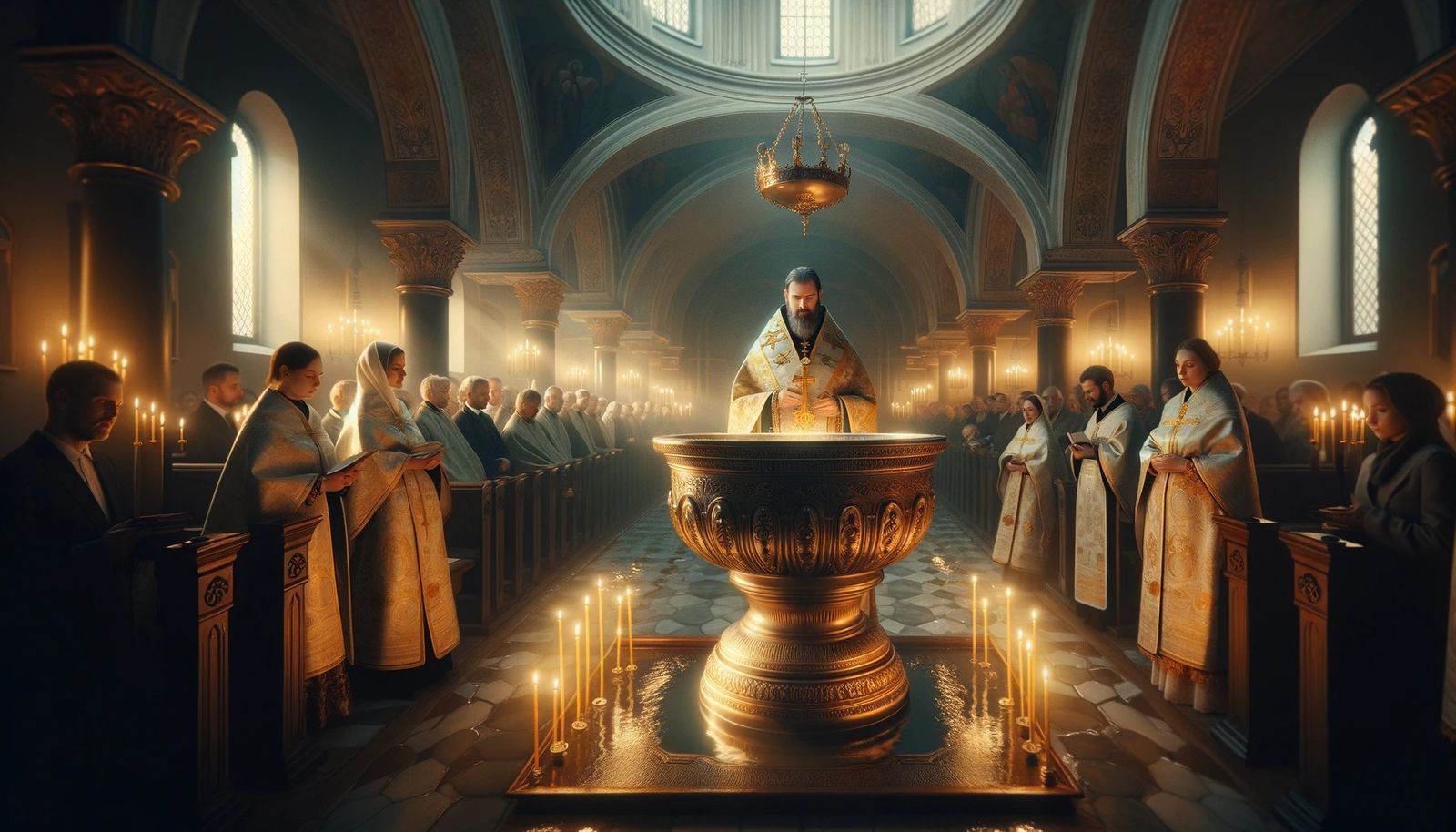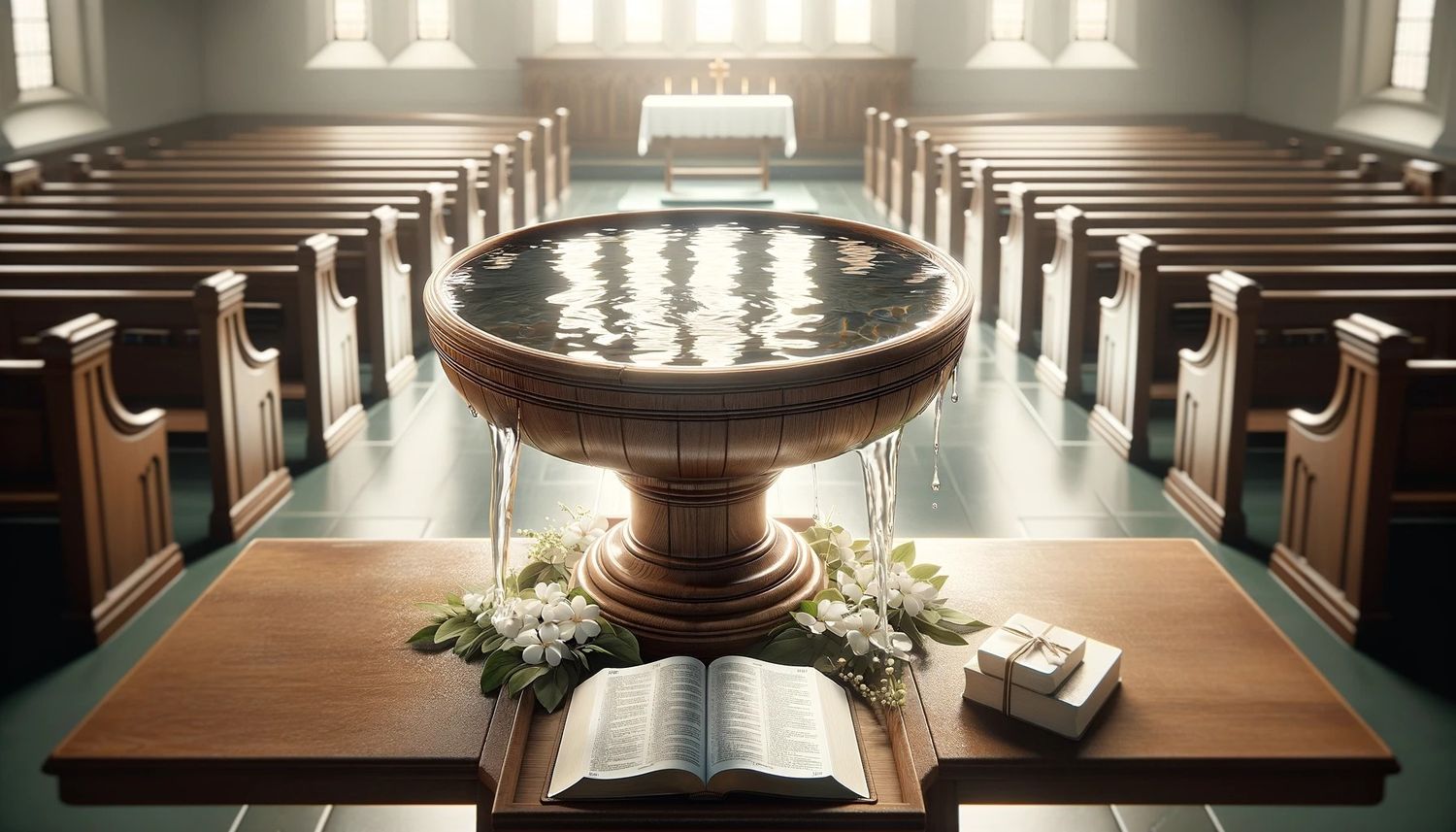Home>Theology and Spirituality>What Does Catholicism Believe About Salvation


Theology and Spirituality
What Does Catholicism Believe About Salvation
Published: February 15, 2024
Ericka Andersen, an editor at Christian.net, expertly merges digital strategy with content creation, focusing on faith and societal issues. Her communication skills enhance the platform's engaging narratives, fostering meaningful dialogue on belief's impact on society.
Discover what Catholicism teaches about salvation and explore its theological and spiritual significance. Gain insights into the beliefs and practices of this faith.
(Many of the links in this article redirect to a specific reviewed product. Your purchase of these products through affiliate links helps to generate commission for Christian.net, at no extra cost. Learn more)
Table of Contents
Introduction
Catholicism, one of the oldest and most widespread Christian traditions, holds a rich tapestry of beliefs and practices that shape its understanding of salvation. At the heart of Catholic theology lies the profound concept of salvation, which encompasses the redemption and deliverance of humanity from sin and its consequences. Understanding what Catholicism believes about salvation provides a glimpse into the core tenets of this faith and sheds light on its spiritual and doctrinal foundations.
Salvation, in the Catholic faith, is a multifaceted and deeply significant concept. It encompasses not only the individual's personal journey towards reconciliation with God but also the broader narrative of humanity's relationship with the divine. Central to Catholic belief is the understanding that salvation is made possible through the life, death, and resurrection of Jesus Christ. His sacrificial act on the cross is seen as the ultimate expression of God's love and mercy, offering humanity the opportunity to be reconciled with God and attain eternal life.
Furthermore, the Catholic Church emphasizes the communal aspect of salvation, viewing the faithful as members of the mystical body of Christ. This interconnectedness underscores the significance of the faith community in supporting individuals on their spiritual journey towards salvation. The communal dimension of salvation is reflected in the sacramental life of the Church, where believers participate in rituals and rites that symbolize and actualize the grace of God in their lives.
As we delve into the intricacies of Catholic beliefs about salvation, it becomes evident that this foundational concept permeates every aspect of the faith. From the role of faith and good works to the significance of sacraments and the intercession of Mary and the saints, the Catholic understanding of salvation weaves through the fabric of its theology, shaping the lived experience of its adherents.
In the subsequent sections, we will explore the multifaceted nature of salvation in Catholicism, delving into the role of faith, the importance of good works, the sacraments, the intercession of Mary and the saints, and the concept of purgatory. Through this exploration, we aim to gain a deeper understanding of the rich tapestry of beliefs that underpin the Catholic understanding of salvation.
The Role of Faith in Salvation
At the core of Catholic beliefs about salvation lies the pivotal role of faith. In Catholic theology, faith is regarded as the foundational disposition through which individuals enter into a saving relationship with God. This emphasis on faith echoes the New Testament teachings, particularly the writings of the apostle Paul, who expounded on the significance of faith in the Christian life.
For Catholics, faith is not merely an intellectual assent to doctrinal truths; rather, it is a dynamic and transformative trust in God's promises and a personal adherence to Christ. The Catechism of the Catholic Church elucidates the nature of faith, describing it as a gift from God, a supernatural virtue infused by Him, which enables individuals to believe in Him and accept the truths revealed by Christ and proclaimed by the Church.
Furthermore, the Catholic understanding of faith encompasses both assent of the intellect and surrender of the will. It involves a wholehearted commitment to God, a surrendering of one's life to His will, and a willingness to be transformed by His grace. This holistic view of faith underscores its integral role in the process of salvation, as it is through faith that individuals are united to Christ and become partakers of His redemptive work.
In the Catholic tradition, faith is nurtured and sustained through prayer, participation in the liturgy, engagement with Sacred Scripture, and adherence to the teachings of the Church. The sacraments, particularly the Eucharist, are central to the cultivation of faith, providing believers with tangible encounters with the living Christ and strengthening their spiritual journey towards salvation.
Moreover, Catholic theology emphasizes the communal dimension of faith, highlighting the role of the faith community in nurturing and supporting individuals in their journey of faith. The communal aspect of faith is manifested in the celebration of the Eucharist, where believers gather as the body of Christ to profess their faith, receive the sacrament, and be united in their shared commitment to Christ and His Church.
In essence, the role of faith in Catholicism's understanding of salvation is profound and multifaceted. It serves as the gateway through which individuals enter into a transformative relationship with God, participate in the redemptive work of Christ, and journey towards the fulfillment of their ultimate destiny in communion with God. This emphasis on faith underscores the centrality of trust in God's saving grace and the transformative power of a lived faith in the Catholic understanding of salvation.
The Importance of Good Works
In Catholic theology, the significance of good works in the process of salvation is deeply rooted in the teachings of Jesus Christ and the apostolic tradition. The Catholic Church emphasizes the inseparable connection between faith and good works, affirming that both are essential components of the Christian life. This emphasis aligns with the teachings of the New Testament, particularly the writings of James, where the relationship between faith and works is expounded upon.
Good works, in the Catholic understanding, are the tangible expressions of faith lived out in love and service to others. They are seen as the natural outgrowth of a genuine and vibrant faith, reflecting the transformative power of God's grace in the lives of believers. The Catechism of the Catholic Church underscores the importance of good works, affirming that they are meritorious and contribute to the growth in grace, the building up of the Church, and the attainment of eternal life.
Central to the Catholic understanding of good works is the concept of charity, encompassing acts of love, compassion, and selfless service towards others. The Church teaches that charity, expressed through concrete deeds of mercy and justice, is a hallmark of authentic discipleship and a visible sign of the presence of God's love in the world. The corporal and spiritual works of mercy, rooted in the teachings of Jesus, exemplify the practical outworking of charity in the lives of believers, calling them to feed the hungry, clothe the naked, visit the sick and imprisoned, and offer counsel and consolation to those in need.
Moreover, the Catholic tradition emphasizes the moral dimension of good works, highlighting the importance of living a life of virtue and integrity. The cultivation of virtues such as humility, kindness, patience, and generosity is viewed as essential in shaping the character of believers and fostering a life marked by moral excellence and ethical conduct. The pursuit of moral goodness and the avoidance of sin are integral aspects of the Christian vocation, reflecting the transformative impact of God's grace on the human person.
In summary, the Catholic understanding of salvation underscores the intrinsic link between faith and good works, affirming that both are indispensable in the Christian life. Good works, rooted in charity and moral virtue, serve as tangible expressions of faith and bear witness to the transformative power of God's grace in the lives of believers. Embracing the importance of good works, Catholics are called to embody the love of Christ through acts of compassion, justice, and moral integrity, thereby participating in the redemptive mission of the Church and contributing to the realization of God's kingdom on earth.
The Sacraments and Salvation
The sacraments hold a central position in the Catholic understanding of salvation, serving as visible signs of God's invisible grace and as channels through which believers encounter the saving work of Christ. Rooted in the teachings of Jesus and the apostolic tradition, the sacraments are regarded as efficacious signs instituted by Christ, through which divine life is dispensed to the faithful. In the Catholic faith, the sacraments are pivotal in the journey of salvation, as they confer and nourish the grace necessary for spiritual growth and transformation.
The Catholic Church recognizes seven sacraments, each bearing unique significance in the life of believers. These sacraments include Baptism, Confirmation, the Eucharist, Reconciliation, Anointing of the Sick, Holy Orders, and Matrimony. Each sacrament is a tangible expression of God's love and mercy, designed to accompany individuals at various stages of their spiritual journey and to sustain them in their pursuit of salvation.
Baptism, the sacrament of initiation, marks the beginning of the Christian life and is the gateway to the other sacraments. Through the waters of Baptism, individuals are cleansed of original sin and incorporated into the mystical body of Christ, becoming members of the Church. This sacrament initiates believers into the life of grace and sets them on the path of salvation, marking the beginning of their journey towards God.
The Eucharist, often referred to as the "source and summit" of the Christian life, holds profound significance in the Catholic understanding of salvation. In the Eucharist, the faithful partake of the body and blood of Christ, receiving Him sacramentally and entering into intimate communion with the Lord. This sacrament nourishes and sustains the spiritual life of believers, strengthening them to live as faithful disciples and empowering them to bear witness to the Gospel in the world.
Furthermore, the sacrament of Reconciliation, also known as Confession, offers believers the opportunity to experience God's forgiveness and reconciliation. Through the ministry of the priest, individuals confess their sins, receive absolution, and are reconciled with God and the Church. This sacrament restores the grace lost through sin and renews the individual's commitment to the path of salvation.
In essence, the sacraments play a vital role in the Catholic understanding of salvation, serving as tangible encounters with the saving grace of Christ and as transformative moments in the lives of believers. Through the sacraments, Catholics are invited to participate in the redemptive work of Christ, to be nourished by His grace, and to be sustained on their journey towards the fulfillment of their ultimate destiny in communion with God.
The Role of Mary and the Saints
In Catholicism, the role of Mary, the mother of Jesus, and the communion of saints holds a significant place in the understanding of salvation. Mary is revered as the Theotokos, the Mother of God, and her pivotal role in the Incarnation of Christ underscores her unique position in salvation history. The Catholic Church venerates Mary as the exemplar of faith and obedience, emphasizing her cooperation with God's plan for the redemption of humanity. Mary's fiat, her "yes" to the angel Gabriel at the Annunciation, is seen as a model of profound trust in God and a testament to her integral role in the salvific mission of Christ.
The intercession of Mary is a cherished aspect of Catholic devotion, as believers turn to her maternal care and seek her prayers on their behalf. The Church teaches that Mary, as the Mother of the Church, continues to intercede for the faithful, presenting their needs to her Son and drawing them closer to His saving grace. This understanding of Mary's intercessory role reflects the belief in her ongoing maternal care for the spiritual well-being of the faithful, affirming her as a compassionate advocate and a source of solace and hope.
Additionally, the communion of saints, comprising the faithful departed and the living members of the Church, plays a vital role in the Catholic understanding of salvation. The Church teaches that the saints, through their exemplary lives of holiness and fidelity to God, serve as inspiring models for believers, encouraging them to pursue lives of virtue and devotion. The communion of saints also encompasses the belief in the intercessory prayers of the saints, as Catholics seek their heavenly assistance and invoke their aid in times of need.
The veneration of the saints, expressed through prayers, devotions, and the celebration of feast days, reflects the belief in their continued participation in the life of the Church and their solidarity with the faithful on earth. The communion of saints underscores the interconnectedness of the mystical body of Christ, affirming the unity of the Church across time and space and the shared pursuit of salvation by all believers, both living and departed.
In summary, the role of Mary and the communion of saints in Catholicism's understanding of salvation highlights the interconnectedness of the faith community and the belief in the ongoing intercessory presence of Mary and the saints. Their exemplary lives, intercessory prayers, and spiritual solidarity with the faithful serve as sources of inspiration, comfort, and encouragement, enriching the lived experience of Catholic devotion and underscoring the communal dimension of the journey towards salvation.
Read more: What Does Catholicism Believe In
The Concept of Purgatory
In Catholic theology, the concept of purgatory occupies a distinctive place in the understanding of salvation. Purgatory is viewed as a state of purification and cleansing for souls who have died in a state of grace but still carry the remnants of sin and imperfection. The belief in purgatory is rooted in the understanding of God's holiness and justice, as well as the transformative nature of His love and mercy.
According to Catholic teaching, those who die in a state of grace but are not yet fully purified undergo a process of purification in purgatory before entering into the fullness of the beatific vision in heaven. This purification is not a form of punishment but rather a merciful expression of God's love, aimed at removing the vestiges of sin and preparing the souls for the perfection of union with God.
The concept of purgatory finds its basis in the understanding of the effects of sin and the necessity of holiness for communion with God. While the guilt of sin is forgiven through the sacrament of reconciliation, the temporal consequences and lingering attachments to sin may remain. Purgatory is seen as the means by which these residual impurities are cleansed, allowing the souls to be fully united with God in the joy of heaven.
The Catholic Church's teaching on purgatory underscores the belief in the transformative power of God's grace and the assurance of His mercy. It reflects the understanding of salvation as a process of ongoing purification and sanctification, emphasizing the continuity of God's redemptive work beyond earthly life.
Furthermore, the belief in purgatory highlights the interconnectedness of the mystical body of Christ, as the living faithful are called to pray for the souls undergoing purification. The Church's tradition of offering prayers, sacrifices, and Masses for the souls in purgatory reflects the belief in the communion of the faithful across the dimensions of earthly life, purgatory, and heaven.
In essence, the concept of purgatory in Catholicism's understanding of salvation illuminates the profound mercy and love of God, the transformative nature of His grace, and the communal solidarity of the faithful in the journey towards the fullness of union with God. It serves as a testament to the belief in the ultimate purification and sanctification of souls, affirming the hope and assurance of God's redemptive plan for all who seek His mercy and love.
Conclusion
In conclusion, the Catholic understanding of salvation encompasses a rich tapestry of beliefs and practices that reflect the profound depth of its theological heritage. From the pivotal role of faith and the inseparable connection between faith and good works to the sacraments as tangible encounters with the saving grace of Christ, the intercessory role of Mary and the communion of saints, and the concept of purgatory as a state of purification, Catholicism offers a comprehensive framework for comprehending the journey towards reconciliation with God and the attainment of eternal life.
Central to this understanding is the recognition of salvation as a multifaceted and communal reality, encompassing the individual's personal relationship with God and the interconnectedness of the faith community. The emphasis on faith as the gateway to salvation underscores the transformative power of trust in God's promises and the lived experience of a vibrant and dynamic faith. The integration of good works as expressions of faith lived out in love and service to others highlights the inseparable nature of faith and moral action in the Christian life.
The sacraments, as visible signs of God's invisible grace, stand as pivotal moments in the journey of salvation, providing believers with tangible encounters with the redemptive work of Christ and nourishing their spiritual growth. The intercessory role of Mary and the communion of saints underscores the communal dimension of the faith journey, affirming the solidarity of the faithful across time and space and the ongoing participation of the saints in the life of the Church.
Moreover, the concept of purgatory serves as a testament to the transformative nature of God's love and mercy, affirming the belief in the ultimate purification and sanctification of souls in preparation for the fullness of union with God in heaven.
In essence, the Catholic understanding of salvation weaves through the fabric of its theology, shaping the lived experience of its adherents and offering a profound vision of reconciliation, transformation, and hope. It is a testament to the enduring richness of Catholic tradition and the enduring relevance of its theological insights in the contemporary quest for meaning, purpose, and ultimate fulfillment.
